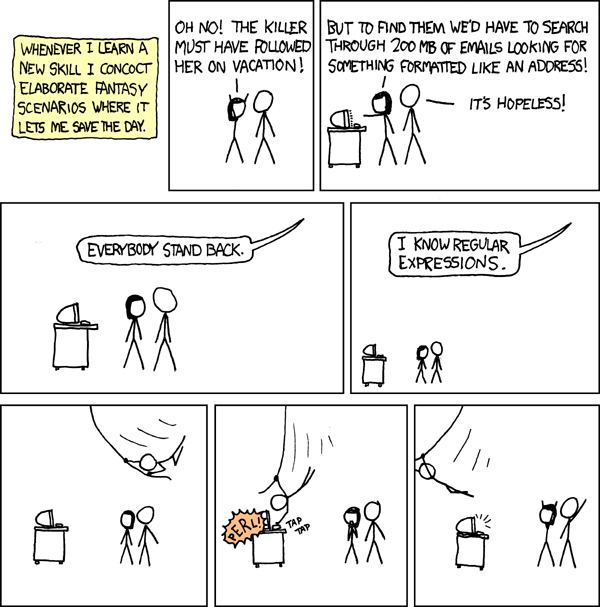Language Processors (F29LP)
Course overview
Welcome to the Language Processors webpage. In a nutshell, this course says:
“What is a computer language, really? Well, let’s generate the language by recursive rules (or automata—same thing) … then let’s give the language semantics …”
See this year’s course.
I’m co-lecturing this course with my colleage Gudmund Grov.
Lecture times
- Mondays at 14:15 in EM3.36.
- Tuesdays at 10:15 in EM2.44.
- Tuesdays at 14:15 in EM1.82.
- There are also labs. I will discuss this in lectures.
Lectures
- Lecture of Monday 12 January at 14:15
- Watch it and/or read the slides for lecture 1.
See the regex resources. - Lecture of Tuesday 13 January at 10:15
- This was a chalkboard and piece of chalk experience. Very retro, and I rather enjoyed it. However, due to technical difficulties I was unable to record this.
- Lecture of Tuesday 13 January at 14:15
- Watch it and read lecture 2, on formal grammars.
- Lecture of Monday 19 January at 14:15
- Watch it and/or read the slides for lecture 3.
- Lecture of Tuesday 20 January at 10:15
- Watch it and read lecture 3.
- Lecture of Tuesday 20 January at 14:15
- Watch it and read lecture 3.
- Lecture of Monday 26 January at 14:15
- Watch it.
- Lecture of Tuesday 20 January at 10:15
- Watch it.
- Lecture of Monday 2 February at 14:15
- Watch it.
- Lecture of Tuesday 3 February at 10:15
- Watch it.
- Lecture of Monday 9 February at 14:15
- Watch it.
- Lecture of Tuesday 10 February at 10:15
- Watch it.
See also last year’s lectures.
The Rules
1. Turn up!
2. Understand lecture materials as you get them.
3. A student who thinks “I don’t understand this now; I’ll sort it out during the holidays” is in denial (look at 1m03s).
4. Rules 1-3 above apply especially to those who believe rules 1-3 above don’t apply to them.
List of lecture slides
lecture-1.pdf lecture-2.pdf lecture-3.pdf lecture-4.pdf lecture-5.pdf lecture-6.pdfTutorials
- Tutorial I.
Exercises …
… are here.
Regex resources
- debuggex, which draws pictures of the regex (see this example), is fantastic.
- The lightweight regexpal and rather heavier-weight regexr and regex101, which you could test on The Jabberwocky.
- A page on regular expressions in Perl.
- This tutorial on regular expressions.
- This advanced page on sed.
Automata resources
Lewis Maitland kindly drew my attention to these two great tools:
- An automaton simulator.
- A tool for converting a regex to an NFA or DFA.
- For examples of automata “in nature”, see the following:
- Crispian Jago’s alternative therapy flowchart.
- I note also his conspiracy theory flowchart.
- Or, you could read instructions for operating a digital watch. These are all automata.
If you find an online tool for generating parse trees given a grammar, or for converting between context-free grammars, PDAs, and parsers, then please let me know.
The following are not automata but they’re so funny, I’ll mention them anyway:
Grammar resources
- See the online production grammar tool.
- Jison converts context-free grammars to Javascript, you can try it online.
- Here’s quite a nice parse tree generator
- And here’s another
Other course resources
You might like to have a look at:
- I really like bits of Jarkko Kari’s notes on Automata and formal languages (from his course at the University of Turku in Finland).
- Eitan Gurari’s course notes on formal grammars (from Ohio State University in the USA).
- Andrew Black’s course on computational structures is a model of online accessibility.
- Computer science degrees often include a course on automata and formal languages. It is often called “Automata and Formal Languages”. Just search Google for automata and formal languages solutions, and explore.
- The Wikipedia page on formal languages.
- The Wikipedia page on the Chomsky hierarchy has a good cheat-sheet at the bottom.
Mock paper and 2014 exam
A mock paper for my half of the course is available, along with the 2014 exam and resit:
- Without solutions (do this first).
- With solutions.
- The exam and resit from last year are in Vision under Learning Materials.
Suggested films
You might like to watch:
- Jumper, for illustrating the importance of the initial state of a system (you don’t want the initial state of your otherwise perfect system be 100 feet up in thin air).
- Warm Bodies, for daring to imagine that Romeo and Juliet can be remade as a Zombie teen romance.
- Finding Nemo (for the sharks scene),
- Despicable Me (for minions).
- Terminator and 12 Monkeys (for logically valid but undesirable attempted implementations of the specification “bring peace to Earth”),
- Star Wars (for Obi-Wan’s comment to Luke about truths depending on one’s point of view),
- Blade Runner (for a personal lecture by Rutger Hauer), and
- RoboCop, for Murphy’s assertion that “\( \text{coming with me}(x,y) \)” is a tautology, where \( x:\mathsf{PERP} \) and \( y:\mathsf{LIFESTATE} \) and \( \mathsf{LIFESTATE} ::= \mathsf{dead} \mid \mathsf{alive} \).
- Scanners, for the totally realistic portrayal of what happens to undergraduate students who think about quantifiers.
A bit about me
I am a researcher in theoretical computer science. My research is mostly in formal logic.
Everybody calls me Jamie but my name is actually Murdoch. You can contact me by e-mail on “gabbay at macs hw ac don’ttypethis uk”. My office is G.50 Earl Mountbatten Building.
The students …
… should be mostly third year undergraduate students.
If you don’t know what an undergraduate student looks like, think of minions, but less yellow.
